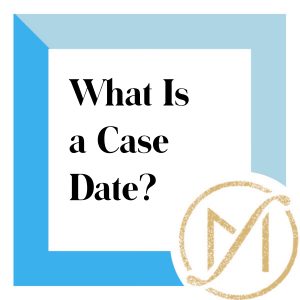What Is a Case Date?

One of the questions that may arise in your family law matter is “What is a Case Date?”
Read on to learn more.
Case Date Basics
A “Case Date” in Connecticut family law is a one-hour case management conference. It may also include a hearing before a Judge to address various motions.
What Is a Case Management Conference?
At its heart, a case management conference is an opportunity for the Judge to ask the lawyers and parties how far along they are in the case, and how much time they need to accomplish discovery. Based on what is shared, the Judge may issue a Scheduling Order.
A Scheduling Order is a court order that determines the flow of the case from the date the judge enters it through trial.
In other words, via a Scheduling Order, the court can establish dates for trial and other court hearings as well as due dates for discovery. It’s also possible that the court will include dates for court-provided Family Relations services including meetings and ADR tools.
Read:What Is the Case Management Date?
Read: ADR & Divorce
What Is Discovery?
Discovery is the exchange of legal information and known facts of a case. Think of discovery as sharing background information and evidence so that both parties can make informed decisions. For example, imagine negotiating a settlement agreement on property division without knowing all the property owned by both spouses. Or, imagine deciding to move forward to trial without knowing how the business appraiser will testify. That’s why discovery is so important. For many people, the first discovery you’ll work on is the first version of your financial affidavit. The judge is likely to discuss the discovery status at your Case Date is because it impacts the timing of your case. For example, in the Scheduling Order, the judge might set a deadline for financial discovery to be completed prior to scheduling a hearing on alimony.
(This is also one of the reasons it’s so important to respond promptly to your attorneys’ requests for documents or information — not to mention you risk running afoul of the court’s orders if you don’t.)
Read:Discovery in Connecticut Divorces
What Is a Court Hearing?
A hearing is a proceeding before the Court. The spouses’ attorneys present evidence and argue in support of their claims, after which the Judge issues a ruling.
What Happens If There’s a Hearing at the Case Date?
When there is a hearing at a Case Date, it’s typically to address temporary, or pendente lite, motions. Attorneys for both sides present evidence, and the Judge issues a ruling. You may not have any Case Dates, or you may have multiple Case Dates — it all depends on which Connecticut family court you’re in, and the specifics of your divorce, custody, or other family law matter.
How Will I Know If There Will Be a Hearing at the Case Date?
That’s the trick — you almost certainly won’t know in advance. It largely depends on the availability of judges in Court that day. You have to prepare for the Case Date like you are having a hearing.
What Is a Pendente Lite Motion?
Pendente lite is a Latin term meaning “awaiting the litigation” or “pending the litigation.” It applies to court orders in effect while your divorce is pending. Divorcing spouses can ask the court to order multiple things to go into effect while the divorce is pending. For example, there might be a temporary parenting plan. Or, there could be pendente lite child support or alimony. Another example of a pendente lite motion is a contempt when there’s a potential violation of the automatic orders.
Read: What Does Pendente Lite Mean?
Read:What is a Motion for Contempt?
Hearings vs. Trials
Hearings and trials are similar in that they both decide important legal issues. However, for the most part, hearings are used to obtain temporary orders that will help provide stability until a divorce is finalized.
A divorce or custody action concludes at a final hearing. If you and your spouse are able to reach an agreement on all outstanding issues, your final hearing is an Uncontested Final Divorce Hearing. If you aren’t able to reach a final agreement, your final hearing is a trial.
The hearings that occur at Case Dates are not trials.
Read:What’s the Difference Between a Hearing and a Trial?
Case Date vs. Resolution Plan Date
Sometimes people confuse a “Case Date” with a “Resolution Plan Date.” Unlike a Case Date, a Resolution Plan Date (or “RPD”) is a meeting with Family Relations. At your Case Date, it’s possible that you’ll meet with Family Relations before your hearing itself begins. That said, the main feature of a Case Date is the case management conference, and possibly a hearing.
Read:What Is a Resolution Plan Date?
Next Steps
For more information about Connecticut divorce and family law, check out our Divorce Information and Facts. If you have questions or want to learn more about how our team of divorce attorneys can help you with your divorce or post-judgment issue, please contact us here.








